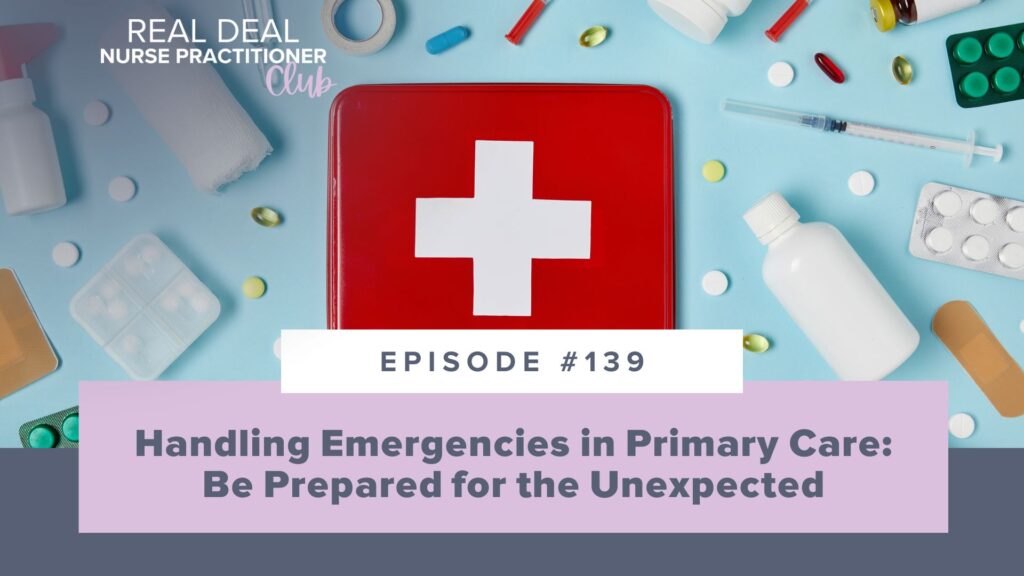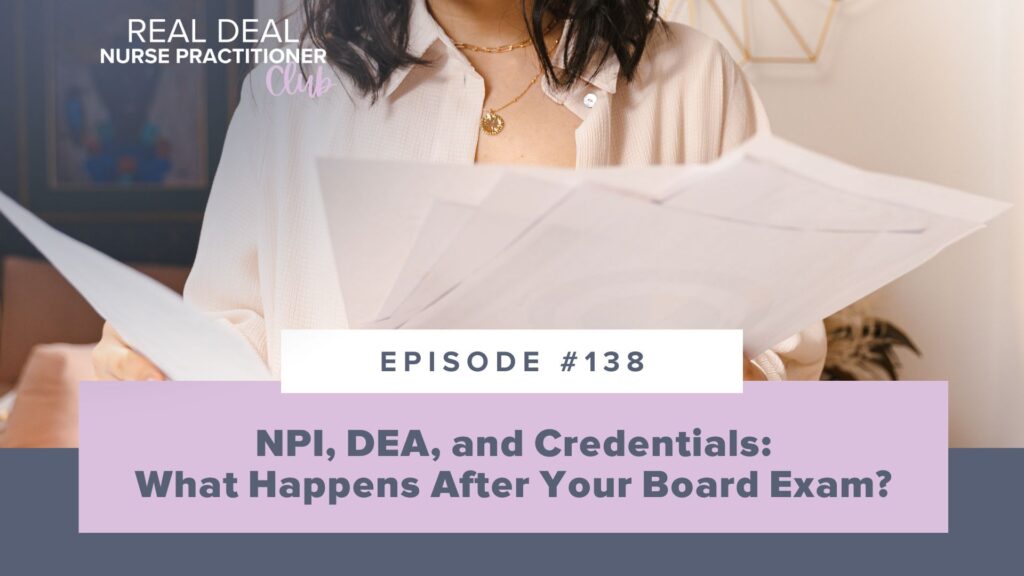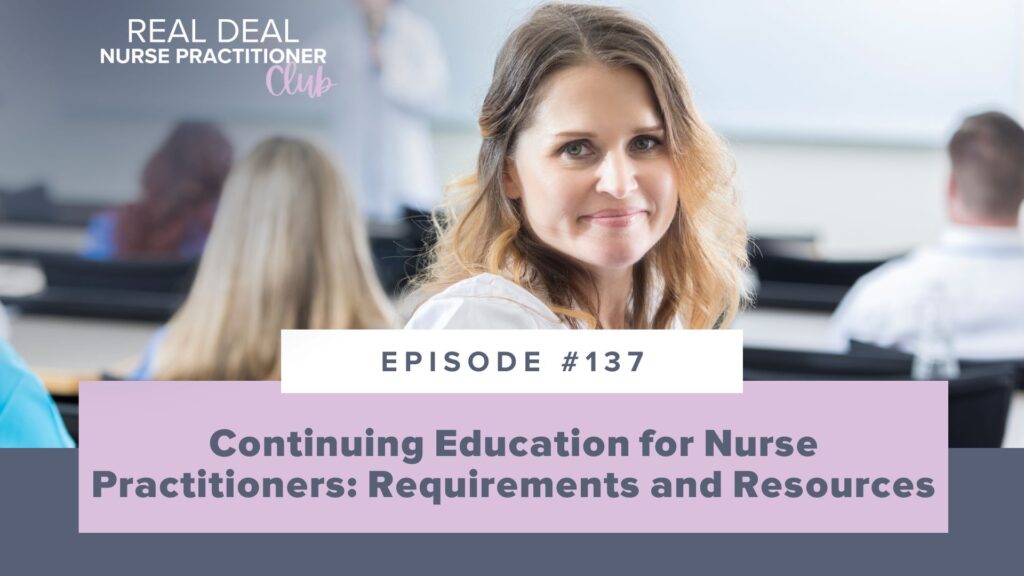Ep #118: Employment Contract: Don’t Sign Until You Hear This
- by Sarah Michelle
- Jul 24, 2024
- Podcasts
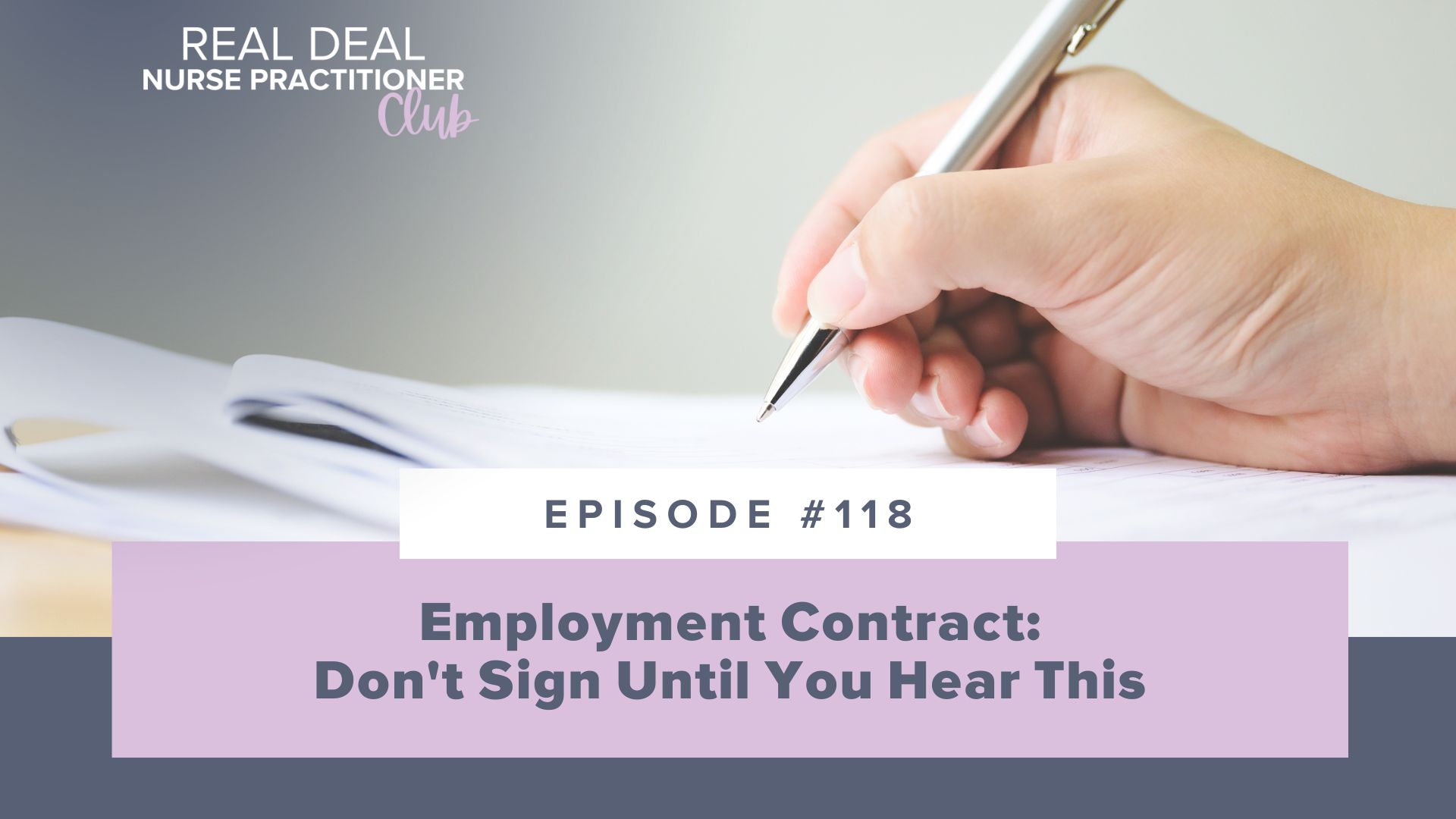
What You Will Discover:
- The 2 most common compensation methods in employment contracts.
- What you must consider regarding compensation.
- Our insights on bonuses based on RVUs.
- The importance of having orientation and mentorship in your employment contract.
- Some of the benefits you might be entitled to as a real-deal Nurse Practitioner.
- Important questions to ask regarding your employment contract.
Featured on the Show
- Follow me on: Facebook | Instagram | YouTube | TikTok
- Follow us on TikTok and YouTube!
- Check out our Job Hunt Course!
- Ep #20: Job Hunt: Know Your Worth
- Ep #76: Job Offers: Green and Red Flags
- Ep #106: How to Succeed on Your First Day as a New NP
- U.S. Bureau of Labor Statistics
Full Episode Transcript:

Welcome to the Real Deal NP Club. Whether you’re hoping to become a real deal nurse practitioner or you already are one, this is the place for you to get the resources you need as you tackle this massive transition into practice. We’re your hosts, Sarah Michelle, Chief Nursing Officer of Blueprint Test Prep, and Anna Miller, Director of Nursing Content. And we’re here to hang out with you each week like your best friends in the NP space. Let’s dive in.
Sarah: Hello, my friends. We have talked a lot about finding a job as a real deal nurse practitioner. In fact, we have a whole job hunt course about it. And we’ve even talked about what to expect on your first day in your new role. But what we haven’t really covered as much are some of those finer points of working as a nurse practitioner. And one of those things is your employment contract.
And so today we’re going to talk about different areas or clauses and what those might mean in your contract, and some things that you really want to pause and just focus on and make sure you get it right. And Anna is here with me today to provide some additional insight into this next big step of your career, which is awesome.
Anna: Yes, and I fully believe that everybody listening to this can find their dream NP job. But when you get that offer with a contract, it can be scary and it can be intimidating, right? What is a non-compete clause? Will your employer cover malpractice insurance? Should you carry your own malpractice insurance? What things are negotiable? And there’s so many big terms. I know I had somebody even look at mine when I got my first contract.
Sarah: Yes, there’s lots of legal jargon involved. And so we really do have a lot to cover today and lots of really great information to share with you all too.
So starting out with probably the most important part of your contract, how are you going to get paid? And this seems like a pretty easy answer, but there are actually quite a few different ways that nurse practitioners are compensated.
Anna: Yeah, it was something I really never thought about until I got into clinical practice as an NP, right? Because as an RN, I was always paid by the hour. Or I know RNs can have a salaried position, but there are quite a few other options for NPs that I really only heard about every once in a while if a physician, say, was talking about it at the hospital.
Sarah: Yeah, for sure. You know, the two most common compensation methods are salary or by the hour. And I just want to throw out there, NP salaries vary a lot between states. And I do mean a lot due to different costs of living.
And salaries can vary quite a bit between specialties and types of clinics. And so we really, me and Anna both highly recommend checking out the US Bureau of Labor Statistics because that site for you is going to break down salaries by state and industry. So think of like outpatient clinics versus hospitals versus those long-term care centers, et cetera.
And Anna, what are some other things we should consider regarding compensation?
Anna: Yeah, I’ve known people that were paid a flat fee for a day, as well as a flat rate per patient they saw. Now, when it comes to a flat rate per day, you want it to average out to a decent per hourly rate. And also take into consideration the complexity of patients you are seeing, right?
You would want a higher rate if you are prescribing medications and managing care, than maybe a position where you’re mostly just doing chart reviews or insurance evaluations.
Sarah: Yeah, and then what about fee per visit?
Anna: So that it really should depend again on the complexity and the amount of patients you are seeing, right? I had someone tell me that they received a flat reimbursement of $30 per patient working per diem in long-term care. But those visits could range from a quick follow up on labs, all the way to an hour long admission and chart review, or even an in-depth management of chronic illness exacerbation. And so some days they only see six or seven patients, but it took all day long. And then they only made about, you know, just over $200 from that shift.
Sarah: Yeah, that is definitely real life in long-term care centers. I did a lot of clinical rotations and long-term care centers and it is mind blowing the complexity difference from patient to patient. And I think it’s also really important to think about what your needs are, and make sure that you’re being compensated fairly for that.
As a new nurse practitioner, you should not expect to have a top range of NP salaries in your state, we understand that. But that doesn’t mean you should also be making the lowest amount either. That’s where you really have to advocate for yourself.
Anna: Yeah. And I think the other area of compensation that we get a ton of questions about that we’re just not familiar with entering into practice is RVUs. So can you go over compensation or bonuses based on RVUs?
Sarah: Yes, I was very fortunate that one of the places I did clinical rotations, actually, one of the long-term care centers was an RVU compensation method, because I got a little bit of experience before I graduated. And I feel like a lot of NP jobs are pivoting to now being based on RVUs.
So this is just another method of compensation. And a lot of times too, you’ll hear about it in relation to bonuses as well. And so RVU stands for relative value unit. And it is a system used by the Centers for Medicare and Medicaid, and some private insurers, as a method for compensating clinicians.
So for example, let’s say that a level three outpatient visit is worth three RVUs. A level four visit is worth six RVUs. A level five is worth 10 RVUs. These are all completely hypothetical reimbursements, but I just want to illustrate how an RVU changes based on how complex that visit is. Like we were just talking about, where I was saying you never know what you’re going to go in from one room to the next when it comes to a long-term care center.
Anna: So just to put it simply, would you say that if you are seeing more complex patients with higher levels of care, then in that case, your reimbursement is higher?
Sarah: Exactly. And then those RVUs are multiplied by what they call a conversion factor. So for example, you might have earned 20 RVUs last week at a conversion rate of $30 per RVU, meaning that your reimbursement is going to be $600. So your salary might be based on the average number of RVUs that a clinician bills for in a year. But if they’re seeing more patients, or they’re seeing less patients but more complex patients, they might receive a bonus based on any of those additional RVUs.
I know they can be common now since most places are moving into using RVUs that have a set amount of RVUs that you have to get to in a week. And then anything above that, you get a bonus for. So there’s a little bit of sway there as well.
Anna: Yeah, but just make sure you are looking in your contract and understanding how you’re getting paid and what needs to be met for you to get paid.
And then another important area of your contract is definitely your schedule, right? Hopefully during your interview you gain a good understanding of what the clinic schedule is like, how many patients you’re expected to see in a day. But make sure you read the fine print, right?
Will you slowly be ramped up over a few months to the patient per day goal? Or will you be expected to start right off? Because I see a lot of new grads going in and expecting to have patients every 15 minutes. You also absolutely need to be looking if you will be given any orientation or mentoring. Will you be required to stay late for any reason?
And a huge one that I always advocate for, will you have administrative time during the day or the week to catch up on calls and results and documentation?
Sarah: Yes, all these are very, very important questions. And they might not be things that you knew that you needed to ask about during your interview. Or maybe your employer just didn’t thoroughly explain them to you.
So we cannot stress enough how important orientation and mentoring is going to be. If there’s not anything in your contract about it, you should negotiate for it. Especially as a new nurse practitioner, you want to make sure that you’re going to be supported in your role transition and set up for success. But even as an experienced nurse practitioner, you will still need orientation and mentoring in a new place where maybe you’re seeing a new patient population. Like there will be things that are different, and you’re going to want that extra nurturing.
Anna: Absolutely, absolutely. And another part of your schedule might be making patient rounds, right? In primary care that could be seeing patients in one of those long-term care settings that we talked about or a group home. So ask how you’d be compensated for that if that’s going to be part of your role as well.
Sarah: Yes, home visits are definitely becoming more prevalent. And so are you going to be compensated for travel? Will you have a designated day for those home visits? Is it expected that you fit them in with your regular schedule? Like, these are all things that you need to be asking.
Anna: Yeah, and then there is call, right? There’s usually phone coverage after hours for patient questions and concerns. So things to ask about are like the frequency of call, who else participates in the call coverage? How will you have access to patient information for these? And of course, how you will be compensated.
Usually from what I’ve heard from colleagues is that call is a flat reimbursement per day.
Sarah: Now let’s move on to some of those benefits that you might be entitled to as a real deal nurse practitioner now being in clinical practice. Besides salary and compensation, which are of course important, there are going to be some other things to consider when you’re reviewing that contract. A big one is going to be time off.
While we hope that you absolutely adore being a real deal NP, self-care and time off are super important for your general well-being. Most new nurse practitioners start off around three to four weeks per year. But that might be more depending on the organization and any prior employment at that organization as well.
And then, Anna, what are some of those other benefits to look over?
Anna: Yeah, definitely look at insurance benefits. I know that’s a huge one. So what is the insurance coverage you’d be eligible to receive for health, vision and dental? And other big questions to ask here, do benefits start on day one? Or do you need to be employed for a certain amount of time? Because other insurance benefits might include short term disability or life insurance, and depending on your personal situation and when you need those implemented, all of those can be important questions to ask.
Sarah: Yes, this can be a great time for just a general reminder to never make assumptions, especially about things like insurance benefits and when they start.
And then I always ask about professional development or any continuing education funds that I will receive as part of my benefits. As nurse practitioners, you are required to have a certain amount of those CE credits to maintain your license, maintain your certification. And most employers will provide some degree of reimbursement for those activities, especially in regards to travel expenses to attend different conferences.
Anna: Yeah. And just speaking of reimbursement in general, make sure to ask about reimbursement of fees for things like licensure and malpractice insurance. State licensure and national certification fees can become expensive. And if you are going to be prescribing any controlled substances, a DEA license costs over $800 every three years. But many employers help with the cost of those fees or you can negotiate for that.
And just make sure you understand how you are covered for malpractice, right? Larger organizations will typically add you on to their malpractice coverage. But if not, you absolutely need to purchase your own coverage.
Sarah: And I know for me personally and just my peace of mind, it’s not really a bad idea to have your own separate malpractice policy away from your employer, because if you change employers, you’ll have coverage in place should a claim be filed against you after you leave that current employer.
Most organizations that provide you malpractice coverage do not include something very important called tail coverage, which means that you are vulnerable for the full cost of claims filed against you after you leave.
Anna: Yes, yes, that is a really, really excellent point to bring up. So make sure you understand that. And while you don’t ever want a malpractice claim, you definitely want to make sure you have the coverage you need.
Sarah: And then lastly here, let’s just talk about some final considerations when you’re looking over that employment contract.
First, let’s see if there’s a non-compete clause or a restrictive covenant. And that basically means if you leave your current position or employer, you may be restricted in the geographical area that you can practice for a certain period of time. I will say this is a big, hot news topic right now, so definitely keep your eyes peeled.
Non-competes might be going away, but in case they don’t, Anna, have you ever had one of these? I know I have.
Anna: I personally haven’t, but I’ve talked to some colleagues that have had some pretty strict ones. One I remember had a 60 mile, two year non-compete and that was for any specialty. So for those who don’t know, that meant that if they left their position, they could not practice as an NP in any specialty or role within 60 miles of the practice location for two years.
And that is part of the reason why these are being looked at with legislation so closely right now.
Sarah: Yeah, because it’s basically a non-employment agreement. It’s not a non-compete, it’s non-employment. But definitely as a whole, some are going to be harsher than others. But the main purpose behind non-competes is to prevent a clinician from taking patients with them if they leave.
So we know that you’re going to be an awesome nurse practitioner to your patients. And so some organizations worry that if you leave, your patients follow you to that new practice and that reduces their revenue. And so while you might like to think that you’ll never leave your new job, you never know what’s going to happen or what changes in your life might occur, and you do not want to significantly reduce your future employment opportunities.
And Anna, is there anything else you want to add to this episode?
Anna: Yeah, I’d say just like one last thing before we wrap up is just make sure that your contract outlines duties that are within your scope of practice. I know that sounds like a no-brainer, but not all organizations or employers may understand the nuances of the NP role. It is very possible that you could be the first NP in whatever practice you’re going into.
And so just double check that your contract doesn’t list any activities that you’re not licensed to do, while also making sure that you are very supported to work to the full extent of your license.
Sarah: That’s actually really important. That happened to me in one of my contracts, actually. They assumed something was in my scope of practice, but it was not. So it’s always good. This is why I like having a lawyer review your contract with you, just in case. I know it’s another fee. It’s another thing to add to the list. But that $300 might save your license someday to have a lawyer review your contract, and so I always think it’s a worthwhile investment because you’re investing in yourself.
Anna: I 100% agree. I had a lawyer look at my first contract, and even though there were no big red flags, they just gave me good things to even ask, like questions I would never have thought about asking my employer.
Sarah: Just in case items, because there’s always going to be a just in case scenario, too.
And I know that it can seem a little complicated, intimidating when you get these big contracts, but reviewing your NP contract is crucial to being on the path to success in your new position. And as you get into interviews, offers, contracts, all the things, you can always listen to this podcast again for a refresher.
And so, Anna, what do you feel like is the biggest takeaway here?
Anna: I cannot stress enough the importance of taking your time and going over each section of the contract. And with that, really making sure that this new position is meeting your needs and meeting your goals, right? It is not all about salary, but also will you have work-life balance and will you be supportive? That I think is my biggest thing. Will you be supported in your new position, especially as a new NP starting out?
But don’t forget how exciting this all is and how great you are going to do as a real deal NP.
Sarah: Yeah, and I think my big takeaway, I’ll keep it short, never assume, always ask. Never be afraid to ask questions about your contract. If they do not want to answer questions about your contract, it is probably a place you do not want to work.
Anna: Yep, absolutely.
Sarah: Thank you, everyone, for tuning in today. We hope you enjoyed this episode and this little bit of contract refresher. And if you need help on the job hunt, if you’re overwhelmed by all of this stuff, we have our job hunt course too that you can find over at npreviews.com, but we’ll be talking to you soon.
As an extra bonus friends, if you’re looking for support no matter what phase of your nurse practitioner journey that you’re currently in, I have communities available for both students and new nurse practitioners. In these communities, we work to uplift one another and grow this profession together every single day. Links to join will be included for you in the show notes.
Thanks for listening to the Real Deal Nurse Practitioner Club. If you want more information about the different types of support that we offer to students and new nurse practitioners, you can visit npreviews, with an S, dot com. We’ll see you next week.
Enjoy the Show?
- Don’t miss an episode: follow the podcast on Spotify, Apple Podcasts or RSS.
Related Posts
Search the Blog
Prepping for Primary Care NP Boards?
Join our Primary Care Live Study Group or check out the Self-Paced Courses & Qbank options!
Learn MoreExplore Specialty NP Qbanks & Mock Exams
Practice with board-style questions for your AGACNP, PMHNP, ENP, WHNP, or PNP exams.
Get StartedJoin our Facebook Group!
Get FREE support and encouragement from thousands of FNP/AGPCNP students and our NP support team.
Join the CommunitySign Up for Free Live Classes
Join us for FREE monthly live study sessions covering topics such as antibiotics, diabetes, musculoskeletal conditions, depression & anxiety, and more!
Grab a Spot